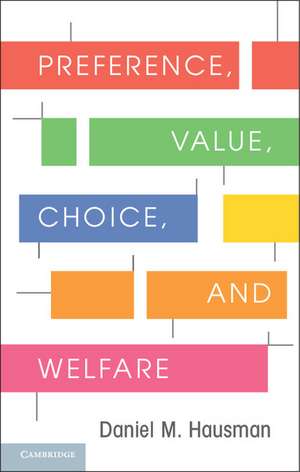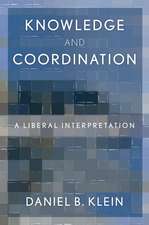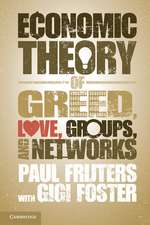Preference, Value, Choice, and Welfare
Autor Daniel M. Hausmanen Limba Engleză Paperback – 11 dec 2011
| Toate formatele și edițiile | Preț | Express |
|---|---|---|
| Paperback (1) | 254.16 lei 6-8 săpt. | |
| Cambridge University Press – 11 dec 2011 | 254.16 lei 6-8 săpt. | |
| Hardback (1) | 692.00 lei 6-8 săpt. | |
| Cambridge University Press – 11 dec 2011 | 692.00 lei 6-8 săpt. |
Preț: 254.16 lei
Nou
Puncte Express: 381
Preț estimativ în valută:
48.64€ • 52.82$ • 40.86£
48.64€ • 52.82$ • 40.86£
Carte tipărită la comandă
Livrare economică 22 aprilie-06 mai
Preluare comenzi: 021 569.72.76
Specificații
ISBN-13: 9781107695122
ISBN-10: 1107695120
Pagini: 168
Ilustrații: 20 b/w illus.
Dimensiuni: 153 x 238 x 12 mm
Greutate: 0.23 kg
Editura: Cambridge University Press
Colecția Cambridge University Press
Locul publicării:New York, United States
ISBN-10: 1107695120
Pagini: 168
Ilustrații: 20 b/w illus.
Dimensiuni: 153 x 238 x 12 mm
Greutate: 0.23 kg
Editura: Cambridge University Press
Colecția Cambridge University Press
Locul publicării:New York, United States
Cuprins
Preface; 1. Introduction; Part I. Preferences in Positive Economics: 2. Preference axioms and their implications; 3. Revealed preference theory; 4. Preferences, decision theory, and consequentialism; 5. Game theory and consequentialism; 6. Constraints and counterpreferential choice; Part II. Preferences, Welfare, and Normative Economics: 7. Preference satisfaction and welfare; 8. Preferences in welfare economics; Part III. Psychology, Rational Evaluation, and Preference Formation: 9. The psychology of choice; 10. Constructing preferences; 11. Conclusions.
Recenzii
'Daniel Hausman has given us a careful, thoughtful disposition on the nature of preferences, which lie at the heart of economics. We thereby learn the basis for what economists are practising when they are preaching.' George Akerlof, Nobel Laureate in Economics, 2001
'To its great loss, mainstream economics has drifted far from philosophy. Dan Hausman, a longtime force against the drift, brings a lifetime of research to this authoritative account of preferences - what they do and should mean to economists and how we can restore a welfare economics that is philosophically and psychologically sound. As social science once again comes together - a project to which this book greatly contributes - this will be one of its central texts.' Angus Deaton, Woodrow Wilson School, Princeton University
'In this penetrating book, Daniel Hausman lays to rest simplistic as well as currently fashionable theories about what preferences are. I think his conception gets it exactly right.' Jon Elster, Columbia University
'Not only is Dan Hausman an outstanding philosopher but he also has a profound understanding of economics and its fundamental concepts. Both these characteristics are on display in this excellent book. Economists will feel a little uncomfortable as some of their most cherished ideas are examined in forensic detail, but Hausman's analysis of preferences choice and welfare places these concepts on firm philosophical foundations, thereby enabling the construction of both better theory and more sensible policy.' Julian Le Grand, London School of Economics
'Daniel Hausman is one of the world's leading philosophers of economics. In this subtle and intelligent book he examines the concept of preference as used in microeconomics, game theory, and welfare economics. He uncovers the tensions between the different interpretations of preference in economics. He offers a resolution that challenges some of the discipline's most cherished dogma but is broadly consistent with its existing practice. It is difficult to imagine a more convincing philosophical defense of what most economists do.' Robert Sugden, University of East Anglia
'To its great loss, mainstream economics has drifted far from philosophy. Dan Hausman, a longtime force against the drift, brings a lifetime of research to this authoritative account of preferences - what they do and should mean to economists and how we can restore a welfare economics that is philosophically and psychologically sound. As social science once again comes together - a project to which this book greatly contributes - this will be one of its central texts.' Angus Deaton, Woodrow Wilson School, Princeton University
'In this penetrating book, Daniel Hausman lays to rest simplistic as well as currently fashionable theories about what preferences are. I think his conception gets it exactly right.' Jon Elster, Columbia University
'Not only is Dan Hausman an outstanding philosopher but he also has a profound understanding of economics and its fundamental concepts. Both these characteristics are on display in this excellent book. Economists will feel a little uncomfortable as some of their most cherished ideas are examined in forensic detail, but Hausman's analysis of preferences choice and welfare places these concepts on firm philosophical foundations, thereby enabling the construction of both better theory and more sensible policy.' Julian Le Grand, London School of Economics
'Daniel Hausman is one of the world's leading philosophers of economics. In this subtle and intelligent book he examines the concept of preference as used in microeconomics, game theory, and welfare economics. He uncovers the tensions between the different interpretations of preference in economics. He offers a resolution that challenges some of the discipline's most cherished dogma but is broadly consistent with its existing practice. It is difficult to imagine a more convincing philosophical defense of what most economists do.' Robert Sugden, University of East Anglia
Notă biografică
Descriere
This book is about preferences, principally as they figure in positive and normative economics.














